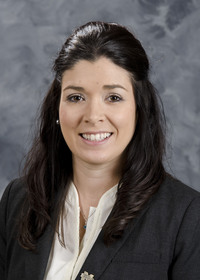Information Possibly Outdated
The information presented on this page was originally released on September 15, 2005. It may not be outdated, but please search our site for more current information. If you plan to quote or reference this information in a publication, please check with the Extension specialist or author before proceeding.
Cattle producers struggle to recover
MISSISSIPPI STATE -- Thousands of miles and millions of dollars worth of fences in south Mississippi were destroyed by Hurricane Katrina, leaving producers with overwhelming odds if they continue in the cattle business.
Mike Keene, area livestock and forages agent for Mississippi State University's Extension Service, is based in Hattiesburg. He said help is arriving in the form of fencing supplies and feed, but challenges abound for farmers.
"There were some cattle losses from trees coming down during the storm, and some cattle are missing. We're having trouble keeping some contained in the remaining pastures," Keene said. "Many barns were destroyed by Katrina, and hay was damaged. Producers probably won't be able to get their third hay cutting this year, which could mean a shortage this winter."
Keene said herds have been moved into smaller pastures with better fences. The result has been overgrazing and the need to feed hay much earlier than normal.
"Producers are brokenhearted as they look at the enormity of the damage. Several are giving up and selling out -- with cow-calf pairs selling at about $150 less than normal. There is just not any local interest in buying cattle pairs," he said.
Sammy Blossom, executive vice president of the Mississippi Cattlemen's Association, said he believes most producers will return to the business after repairing storm damage.
"Many of the cattlemen need to work on their own homes and cannot give their cattle and pastures the necessary attention," Blossom said. "Plus, cattle are a good source of quick money."
Blossom said while support has been flowing into the state, the need is so much greater than the resources he can put together.
"Donations range from a $25 check from a cattlewoman in Vermont to larger donations from various companies," he said. "Cattlemen from South Carolina, Pennsylvania, Georgia, Alabama, Texas and a number of other states are sending feed, chain saws, generators and fencing supplies."
Blossom said volunteer groups are coming in from outside the state to assist with fences, barns and general cleanup.
"Farmers need to keep a record of their recovery expenses, including receipts and logs of time spent working on the fences, barns, debris removal and other storm damage," he said. "It is possible some of these expenses will be covered by disaster payments."
Producers who need help with livestock disaster relief should call 1-888-722-3106.
Contact: Mike Keene, (601) 606-7382



